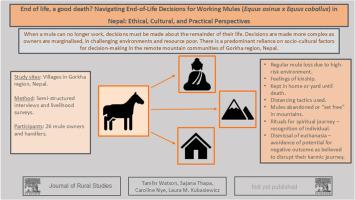生命的终结,一个美好的死亡?尼泊尔工作骡子(Equus asinus × Equus caballus)的临终决定:伦理、文化和实践观点
IF 5.7
1区 社会学
Q1 GEOGRAPHY
引用次数: 0
摘要
本文通过在尼泊尔廓尔喀山区进行的半结构化访谈、观察和调查,调查了尼泊尔工作骡子的临终决定。作者思考了人类和骡子之间的关系,探索了当骡子的工作生活永久结束时,相互关联的影响是如何影响它们的福利的。在尼泊尔的偏远地区,当骡子永远退出工作时,拥有马匹的社区的选择有限,那里的政治制度使边缘化社区被边缘化。因此,为了指导决策,这些社区转向将人类与信仰体系联系起来的社会文化体系,如灵性、伦理、道德和社会价值观;我们将探索骡子如何在这些系统中找到自己的位置。在这些偏远的山区,人口冗余的后果意味着“失业”骡子的未来护理可能包括有限的护理,减少护理,遗弃或永久监禁(直到马科动物死亡)。本文借鉴了朱迪思·巴特勒(Judith Butler)的悲情概念,以理解在工作生涯结束时,工作马匹与主人之间的不稳定性、可弃置性、可怜性和关系纠葛。这项研究有助于研究马科动物的生命终结意味着什么,主人如何做出生命终结的决定,以及这对为人类服务的工作骡子可能产生的影响,特别是增加了文献的缺乏,这些文献如何转化为尼泊尔工作的马。本文章由计算机程序翻译,如有差异,请以英文原文为准。

End of life, a good death? Navigating end-of-life decisions for working mules (Equus asinus × Equus caballus) in Nepal: Ethical, cultural, and practical perspectives
This paper investigates end-of-life decisions for working mules in Nepal, drawing on semi-structured interviews, observations and surveys conducted in the mountainous Gorkha region. The authors contemplate the relationship of humans and mules, exploring how interconnecting influences affect the welfare of mules when their working lives are enduringly concluded. In remote regions in Nepal when mules are permanently retired from work, limited options are available to equid-owning communities, where political systems keep marginalised communities marginalised. So, for guidance in decision making, these communities turn to the sociocultural systems that relate humanity to belief systems such as spirituality, ethics, morality, and social values; we explore how mules find themselves positioned within these systems. Consequences of redundancy within this population meant an ‘out of work’ mule's future care, in these remote mountain regions, may range from limited care, decreasing care, abandonment, or permanent incarceration (until the equid dies). This article draws lightly on Judith Butler's concept of grievability to apprehend the precarity, disposability, mournability and relational entanglements of working equids with their owners at the end of their working lives. This study contributes to a small but growing body of research investigating what end of life means for equids, how owners make decisions about end of life, and what impact this may have for working mules who have spent their life in the service of humans, specifically adding to the paucity of literature relating to how this translates for working equids in Nepal.
求助全文
通过发布文献求助,成功后即可免费获取论文全文。
去求助
来源期刊

Journal of Rural Studies
Multiple-
CiteScore
9.80
自引率
9.80%
发文量
286
期刊介绍:
The Journal of Rural Studies publishes research articles relating to such rural issues as society, demography, housing, employment, transport, services, land-use, recreation, agriculture and conservation. The focus is on those areas encompassing extensive land-use, with small-scale and diffuse settlement patterns and communities linked into the surrounding landscape and milieux. Particular emphasis will be given to aspects of planning policy and management. The journal is international and interdisciplinary in scope and content.
 求助内容:
求助内容: 应助结果提醒方式:
应助结果提醒方式:


